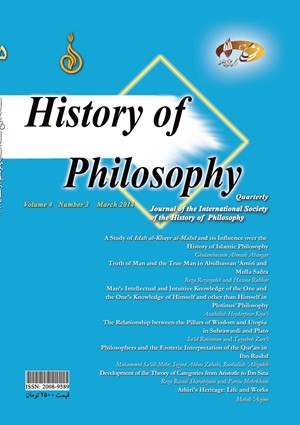-
-
List of Articles
-
Open Access Article
1 - Editor's Notes
Hossein Kalbasi Ashtari -
Open Access Article
2 - A Study of Idah al-Khayr al-Mahd and its Influence over the History of Islamic Philosophy
Gholamhossein Ahmadi Ahangar -
Open Access Article
3 - Truth of Man and the True Man in Abulhassan ‘Amiri and Mulla Sadra
Hassan Rahbar -
Open Access Article
4 - Man’s Intellectual and Intuitive Knowledge of the One and the One’s Knowledge of Himself and other than Himself in Plotinus’ Philosophy
Asadullah Heydarpour Kiya’i -
Open Access Article
5 - The Relationship between the Pillars of Wisdom and Utopia in Suhrawardi and Plato
Saeed Rahimian -
Open Access Article
6 - Philosophers and the Esoteric Interpretation of the Qur’an in Ibn Rushd
Roohallah ‘Alizadeh -
Open Access Article
7 - Development of the Theory of Categories from Aristotle to Ibn Sina
Reza Rasuli Sharabiyani -
Open Access Article
8 - Athiri’s Heritage: Life and Works
Mehdi ‘Azimi
-
The rights to this website are owned by the Raimag Press Management System.
Copyright © 2017-2026







